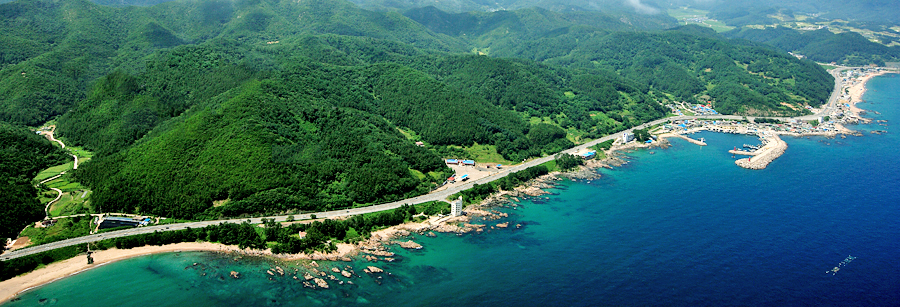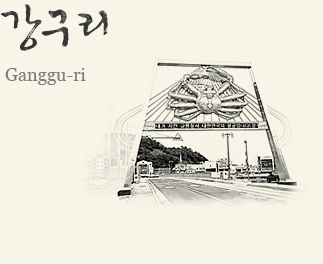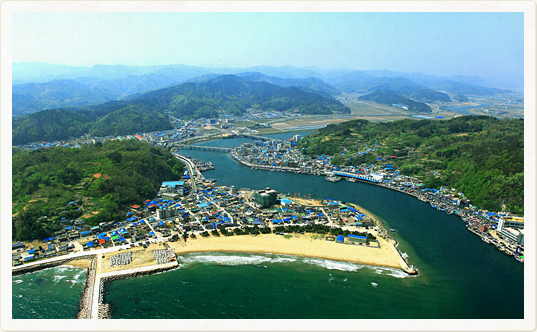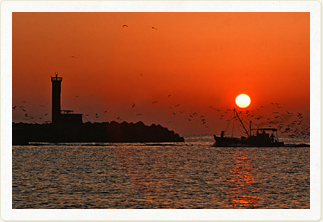

 > BlueRoad Story >
Story of Villages on BlueRoad
> BlueRoad Story >
Story of Villages on BlueRoad
Select each category and see the origin of villages in detail.


It was the estuary toward the Jungnam-myeon, Yeongdeok precinct during Joseon Dynasty, and for that reason was called 'Ganggu' or 'Ganggu-ri'.
According to the Population Census published in 1789, it was divided into the Guganggu Yuk-ri/Guganggu Haeri and Wolganggu-ri and Wolganggu Hae-ri.
In addition, a new village was created by the Japanese in around 1910, and as a result, the village was sometimes called 'Singanggu 'and 'Guganggu'.
With the integration of administrative districts in 1914 during the Japanese colonial rule, Ganggu-ri was incorporated into Yeongdeok-myeon.
As Ganggu-myeon was established as a result of the changes in administrative district system on April 1, 1934, Ganggu-ri was incorporated into Ganggu-myeon.
Ganggu-ri had the Ganggu Port, the distinctive natural port of the East Sea, where many snow crab, shrimp, squid, pollack, yellow tail, spotted mackerel, etc., are caught.
In Ganggu-ri, there are Ganggu Police Station, Post Office, Ganggu Agricultural Cooperative, Maeil Market, Ganggu Fishery Cooperative, Ganggu branch of Pohang Coastal Guard, etc.

• The 'Thunder Sound', a full-length novel of Kim Joo-yeong, is a story spanning the period from the nation's liberation on August 18 from the Japanese colonial rule to the start of Korean War on June 25.
• The novel provides a window into Yeongdeok through the prism of Singilnyeo who become widow in just half a year after her marriage with a man from the gentry family, spanning from the nation's liberation to the Korean War.
• She starts her new life in Wonjeon-ri, Jipum-myeon where Hwang-jang-jae is located, away from the family of his husband. Ganggu Port is the place where she ties the knot with another man and goes through many adversities of life. The novel presents an impressive look into Ganggu Port in late 1940s through the prism of Gilnyeo.
• From the 'Thunder Sound', a novel written by Kim Joo-yeong
• 《From the ‘ring’》
• The preciousness of money became very clear to me until I reached the town along the estuary called 'Ganggu'. Even if I hopped into the car after paying the amount that the driver demanded, I was worried if the driver would drop me off at the desolate and remote road in mountain. When the driver dropped me off at Ganggu, I was ready to give him my new shows to appease him if he wanted. Looking at the sea from the estuary, I found that I still had a long way to go. The scenery of houses at the mountain ridge suggested that I would be able to meet Jisangmo soon and my heart was fluttering with anticipation. I peeped into every houses located closely next to one another at the foot of mountain until the sunset. The young boys were playing stick-tossing game, and young girls were playing house under the mud-plastered wall. Watching them, I forgot that I was starving. I wondered if I could meet the children looking similar to Jisangmo. I knew that I could not find Jisangmo and his families in this way. It was difficult, like fishing in the field. But I could not give up. On the next day, I rushed to the wharf. There were trucks moving in and out of the wharf, as well as the vessels. The place was also bustling with the carts carrying the fishing equipment and basket.
• The atmosphere of estuary was different from that of mountain. The women talked loudly and men liked kidding. It was convenient to ask questions because there was no high barrier between men and women. However, Gilnyeo was surprised to see the sea fish, who thought that the fish would be something like the mackerel, and spent the half-day on watching the estuary as if she lost her mind.
• I calmed myself down, and guessed that men and women walking in and out of the wharf seem to know Jisangmo very well. When I looked at their back, they did not seem to know Jisangmo at all. First, I talked to a woman in her 40s, who was taking out the intestinal bowels from the fish at the corner of wharf. It was Gilnyeo who started the talk. But Gilnyeo was rather asked the questions after exchanging a few words. The middle-aged woman, who asked several questions, pointed to the office of Fishery Cooperatives, and said that I could ask question to the motorists moving in and out of the wharf.
Please refrain from inquiring about food and accommodation